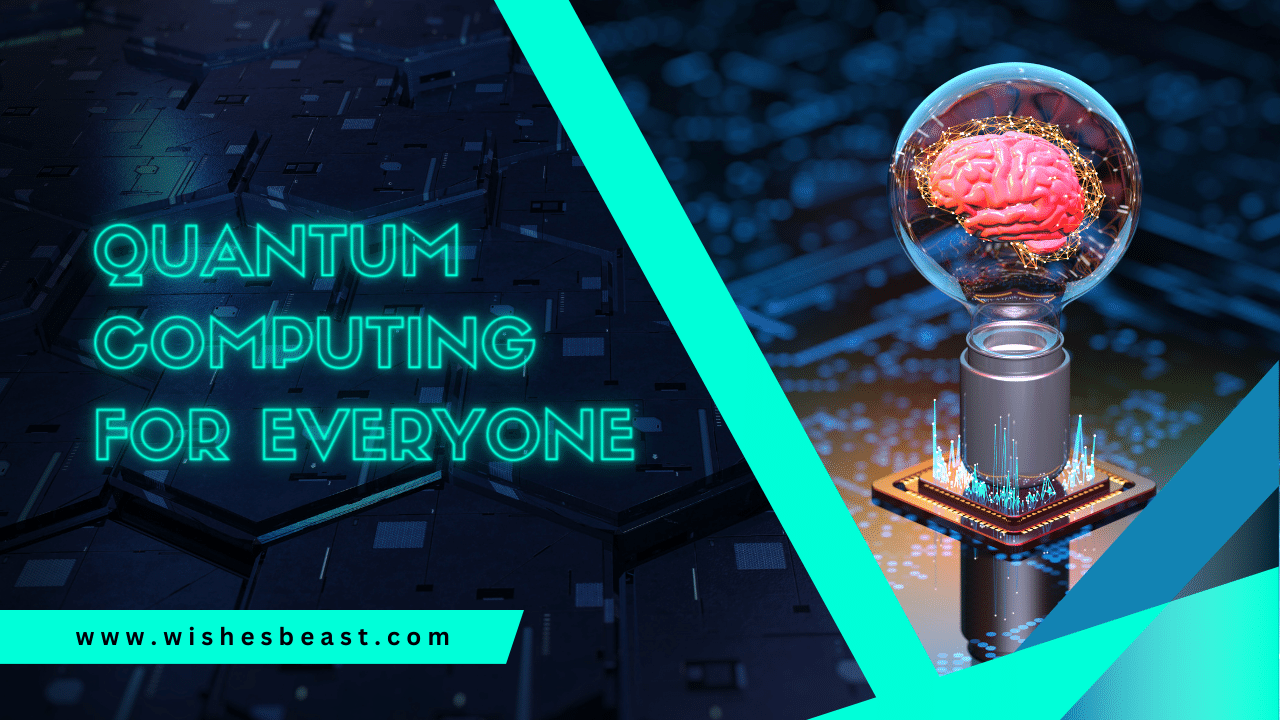Have you ever wondered about a future where computers can perform unimaginably complex calculations in the blink of an eye? Welcome to the world of quantum computing, where the rules of classical computing are rewritten, and the boundaries of what’s possible are pushed to new frontiers. In this article, we’ll demystify quantum computing for everyone, explore its fascinating principles, delve into its applications, and showcase how it’s poised to reshape the landscape of technology.
Quantum Computing Basics
Quantum computing may sound like science fiction, but it’s very real. Unlike classical computers that use bits as the smallest unit of information (either 0 or 1), quantum computers leverage quantum bits or qubits, which can exist in a superposition of states. This means that a qubit can be 0, 1, or both 0 and 1 simultaneously. This unique property enables quantum computers to perform multiple calculations at once, exponentially increasing their computational power.
Exploring Quantum Mechanics for Beginners
At the heart of quantum computing lies quantum mechanics, a branch of physics that studies the behavior of matter and energy at the smallest scales. While delving deep into quantum mechanics might seem daunting, the fundamental concepts are surprisingly intuitive. It’s like peeking into a universe where particles can be in two places at once and can instantly communicate, regardless of distance.
Quantum Algorithms
Quantum computers have the potential to revolutionize industries by solving complex problems that are practically impossible for classical computers to tackle in reasonable timeframes. Quantum algorithms, such as Shor’s algorithm for factoring large numbers and Grover’s algorithm for database search, open doors to groundbreaking possibilities in cryptography, optimization, and more.
Practical Applications of Quantum Computing
Quantum computing isn’t just theoretical – it’s already making waves in various fields. From drug discovery and material science to optimizing supply chains and enhancing artificial intelligence, quantum computers are proving their mettle. Imagine designing new materials with unparalleled properties or simulating intricate biochemical reactions with ease – quantum computing is bringing these aspirations closer to reality.
Quantum Computing Accessibility
While quantum computing’s potential is immense, accessibility has been a challenge. However, the tides are turning. Efforts are underway to make quantum computing more approachable for non-experts. Online courses and resources cater to beginners, enabling curious minds to dip their toes into this extraordinary realm without needing a Ph.D. in physics.
Embracing the Quantum Future
As we stand on the brink of a quantum revolution, the future looks dazzling. Quantum computing’s unprecedented computational power promises solutions to some of humanity’s most pressing challenges. From climate modeling and drug design to revolutionizing machine learning, the possibilities are boundless. With technology giants and startups alike investing in quantum research, the momentum is unstoppable.
Your Quantum Journey Starts Here
Curiosity is the fuel of progress, and quantum computing embodies that spirit. The journey into this realm might be complex, but it’s also exciting and transformative. So, take the plunge, explore beginner-friendly resources, and let the world of quantum computing unfold before you. As quantum technology advances, we’re on the brink of a brighter, faster, and more interconnected tomorrow.
Quantum Computing Breakthroughs
The journey of quantum computing has been marked by remarkable breakthroughs that continue to capture our imagination. One such breakthrough is quantum supremacy – the moment when a quantum computer performs a task that’s practically impossible for classical computers. In 2019, Google’s quantum processor Sycamore achieved this milestone by solving a complex problem in just 200 seconds, a task that would take even the most advanced classical supercomputers thousands of years.
Another awe-inspiring achievement is quantum entanglement, a phenomenon where two or more particles become intertwined in such a way that the state of one particle instantaneously affects the state of the other, regardless of the distance between them. This property lies at the heart of quantum computing’s power. Harnessing entanglement, quantum computers can perform calculations and simulations with an efficiency that classical computers can only dream of.
Quantum Simulations
One of the most tantalizing aspects of quantum computing is its ability to simulate intricate systems that baffle classical computers. In fields like chemistry, where the behavior of molecules can be mind-bogglingly complex, quantum computers offer a glimmer of hope. By accurately simulating molecular interactions, quantum computers promise to accelerate drug discovery, leading to the development of new medicines that could save countless lives.
Marriage of Quantum Computing and AI
The synergy between quantum computing and artificial intelligence holds immense promise. Machine learning algorithms often involve optimizing complex functions, a task that aligns perfectly with quantum computers’ capabilities. Quantum-enhanced machine learning could usher in a new era of AI, enabling more accurate predictions, advanced pattern recognition, and smarter decision-making systems.
Overcoming Challenges
While the potential of quantum computing is undeniable, challenges persist. Quantum bits, or qubits, are delicate and prone to errors due to environmental disturbances. Researchers are working tirelessly to develop error-correcting codes and stable qubits to make quantum computers more reliable.
Another hurdle is scaling up quantum systems. Building larger quantum processors with more qubits is essential to solving more complex problems. However, maintaining the delicate balance required for qubits to function coherently becomes increasingly challenging as the number of qubits grows. This challenge is at the forefront of quantum computing research.
Quantum Computing Education
Education is the cornerstone of embracing quantum computing’s potential. Online courses, workshops, and resources are becoming increasingly available for individuals with varying levels of expertise. These offerings empower curious minds to explore quantum concepts, learn programming languages like Qiskit and Cirq, and experiment with quantum algorithms in a user-friendly environment.
Quantum Computing
In the coming years, we’re poised to witness quantum computing’s continued evolution from a scientific curiosity to a transformative technology that shapes industries, accelerates discoveries, and enriches our lives. As researchers push the boundaries of what’s possible, the mysteries of the quantum world are being unlocked, and the potential for innovation seems limitless.
Quantum Quest Continues
Our journey through the realm of quantum computing has only just begun. As we stand at this exhilarating crossroads of technology, the future is ablaze with possibilities. From quantum-enhanced AI to secure communications and unprecedented problem-solving, the applications are as diverse as they are awe-inspiring. So, whether you’re a seasoned scientist or simply someone intrigued by the potential of the quantum world, remember this: the quantum quest is one of boundless discovery, where the limitations of today are but stepping stones to the breakthroughs of tomorrow. Embrace the excitement, relish the challenge, and let the quantum adventure unfold.
Frequently Asked Questions
Q: Can anyone learn quantum computing?
Absolutely! Quantum computing is no longer confined to physicists. There are beginner-friendly resources and online courses that cater to curious minds from diverse backgrounds.
Q: How will quantum computing impact everyday life?
Quantum computing’s impact will be profound, from accelerating scientific discoveries to optimizing industries like finance, energy, and healthcare. It will usher in a new era of problem-solving.
Q: Are there real-world examples of quantum computing in use?
Indeed! Quantum computers have been used to simulate complex molecules, optimize traffic flow, and explore novel materials, showcasing their practical applications.
Q: How can businesses benefit from quantum computing?
Businesses can harness quantum computing to optimize supply chains, enhance data analysis, and revolutionize cryptography, paving the way for competitive advantages.
Q: Can quantum computing solve problems classical computers can’t?
Absolutely. Quantum computers excel at problems involving vast datasets and complex simulations, where classical computers struggle due to their sequential processing.
Also Read: What is a Current Concern Regarding the Advancement of Quantum Computing?
conclusion
Quantum Computing for everyoneis more than just an emerging technology – it’s a paradigm shift that promises to reshape our world. With the power to solve problems previously deemed insurmountable, quantum computers are on the cusp of unlocking a new era of innovation and discovery. So, embrace the quantum revolution, embark on your journey of exploration, and be a part of the exciting future that awaits.

